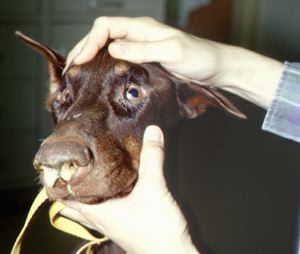Dysautonomia
What's On This Page:
Dysautonomia:
A mystery disease that involves involuntary twitching of the eyes and seems to have something to do with Kansas & Missouri
Eye Information On Other Pages:
Eye Problems in Pets: Intro Page about eye diseases
Pannus; flesh growing over the eyeball
Canine Dysautonomia
Dysautonomia (DIS-auto-NO-mia) is a condition characterized by a malfunctioning autonomic nervous system... the system responsible for involuntary functions like the contraction of smooth muscles, the heart rate, regulation of the pupil size, and so on.
Dogs suffering from the disease typically have dilated pupils that don't respond to light, decreased tear production, and elevated third eyelids. They may also suffer from vomiting or regurgitation due to decreased motility in the digestive tract.
In the majority of cases, the disease is incurable and fatal.
Dysautonomia was first documented in horses in the United Kingdom in the early 1900s. "Grass sickness," as the equine version is known, is still a problem.
In 1982, researchers at the University of Bristol first diagnosed dysautonomia in a cat. What at first appeared to be an anomaly soon became an epidemic, with several hundred cats being diagnosed with feline dysautonomia across the United Kingdom and Europe.
Cases of canine dysautonomia have been diagnosed throughout Europe and in the United States.
In most areas, it's a sporadic occurrence. But for reasons that remain unclear, the highest incidence has been in Kansas and Missouri.
Missouri's first dysautonomia case was diagnosed in a cat in 1986, and only a handful of other feline cases have been documented.
The cause is unknown, and no one is sure why the incidence is so much higher in Kansas and Missouri.
What researchers do know is that there are some common threads in the histories of dogs afflicted with the disease:
The study confirmed suspicions that rural dogs tend to have a greater incidence of the disease. When those afflicted with dysautonomia were compared to rural control dogs, the affected dogs were more likely to have access to pasture land, farm ponds, and cattle, and to have consumed wildlife.
Dogs with dysautonomia were also generally young, according to the study-the median age was about 18 months. The disease occurred most frequently from February to April, with only a few cases identified during the summer or early fall.
The dogs who appear to be at high risk are mostly free-roaming dogs out in the country.
For more information:

Website Directory
Home The Human-Animal Bond The History of Veterinary Medicine About our No Kill Shelter The FoxNest Veterinary Hospital
"What To Expect When You Go To The Vet"
if your pet should have a problem with ...
To include Femoral Head Removal, Hip Dysplasia, Anterior Cruciate Ligament Injuries, Panosteitis, Radiographic Demonstrations, Disc Disease, and Bone Surgery
Strokes, Vascular Diseases, Anemias, DVT, DIC, Blood Parasites, Rat Poison, & Bleeding disorders
Cardiology Heart disease in Cats, Cardiac Hypertrophy, Valvular disease, Cardiac Insufficiency, Congestive Heart Failure, Heartworm Disease, and a little history about the milestones in treating heart disease
Cats: general information page and directory of diseases and problems specific to cats including vaccine recommendations, leukemia, feline viral infections, feline upper respiratory disease and cats that just aren't feeling well.
Dermatology: Skin problems including allergies, rashes, bacterial infections, and itching. Hair Loss, Yeast Infections, Hormonal Problems
Heart disease; Cardiac diseases, vascular diseases, stroke, & heartworms
Hormone Diseases: Diabetes, Thyroid Disease, Cushing's Disease or Hypercortisolism, Addison's disease or Hypocortisolism, Pancreatitis, obesity as a disease
Infectious Diseases Colds, Distemper, Parvo, Leptospirosis, Bruceellosis, Panleukopenia, Feline AIDS, Leukemia, Hepatitis, Kennel Cough, Ringworm, Rabies, FIP, Canine Herpes, Toxic Shock Syndrome, & More
Intestinal problems: diarrhea, constipation, torsion, indigestion, and gas. Also pancreatitis, vomiting, esophagitis, colitis, parvo and other types of dysentery
Metabolic Diseases: Diabetes, Thyroid Disease, Cushing's Disease or Hypercortisolism, Addison's disease or Hypocortisolism, Pancreatitis, obesity as a disease
Neural Problems and Diseases: Epilepsy, Rabies, Distemper, FIP, Paralysis, Tetanus, Seizures, Disc Disease, Toxoplasmosis & others
Parasite Problems Fleas, Ticks, Heartworms, Intestinal Worms, Mosquitos, Lice, Mites, and other welfare recipients
Poisons Snakes, Insects, household chemicals, plants, and foods that might poison your pet
Skeletal-Muscular Problems Arthritis, Fractures, ACL, Ligament Injuries, Disc Disease, Pannus, and many other problems of the bones, muscles, tendons, and ligaments
Skin Problems: allergies, rashes, bacterial infections, and itching. Hair Loss, Yeast Infections, Hormonal Problems
Surgery: Spays, Castrations, Testicle Recipes, Soft Tissue Surgery, Hard Tissue Surgery (Bones), C- Sections, Declawing, Tumor Removal and Cancer Surgery
Other Topics on This Site
Zoonotics: Diseases, worms, and parasites people get from pets.
Includes information about Prescription diets used to treat disease, and a discussion about the pet food industry
Includes information about feline and canine heat or estrus, breeding, C-Sections, pyometra or Infected Uterus, dystocia, no milk, mastitis, & brucellosis
Also newborn care, undescended testicles, and alternative to spaying and castration
WildLife Page: Taking care of baby bunnies, squirrels, and birds. A very funny story about beavers, and other misc information
Our Dog Page: a directory of problems of concern in dogs including parvovirus, distemper, canine herpes, and other diseases

 | ||||||
Thick nasal discharge and raised 3rd lids of the eye are associated with this disease

Kansas farm scene